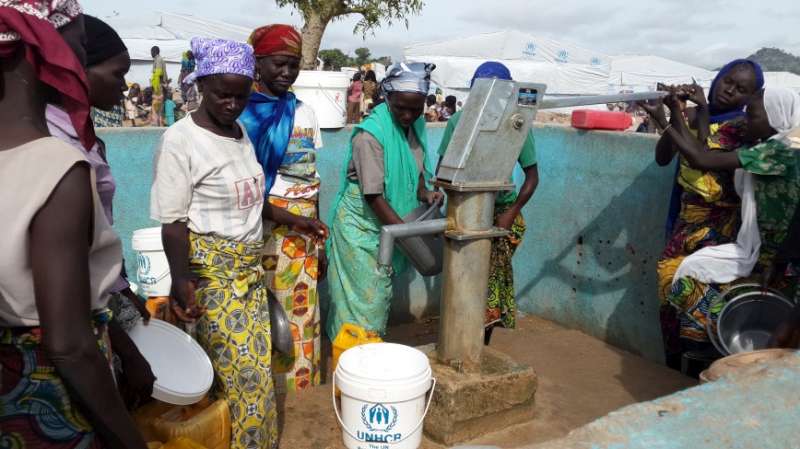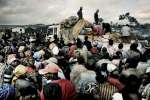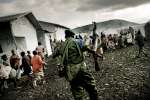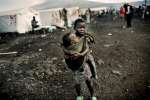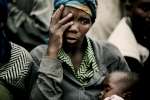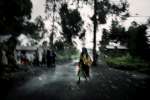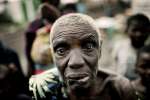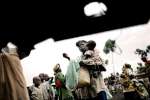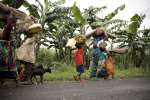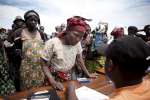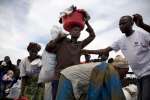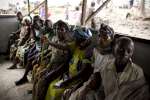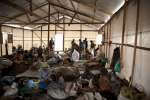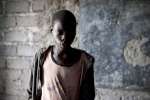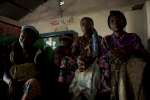As violence spreads beyond Nigeria, UNHCR calls for urgent access to the displaced
News Stories, 13 February 2015
GENEVA, February 13 (UNHCR) – The UN refugee agency, concerned about the spread of violence from north-east Nigeria into neighbouring Chad, Cameroon and Niger, on Friday called for urgent humanitarian access to refugees and internally displaced people in these countries.
In Niger, fighting broke out last week between the Niger armed forces and Nigerian insurgents in the town of Bosso, which is located near Lake Chad in the southern region of Diffa. This has been followed by a series of attacks in Diffa town against civilians, including by suicide bombers. With fear and panic spreading fast, large parts of the population of Diffa are moving further west, towards the city of Zinder.
Spokesman Adrian Edwards told journalists in Geneva that UNHCR had no confirmed figures for the internally displaced, "but we fear that the scale of displacement is high: Prior to the attacks Diffa had a population of 50,000 – today the town is virtually empty."
He added that thousands of people had fled other towns and villages of the region. While most of the internally displaced are hosted in local communities, there are serious shortages of food and clean water.
"This situation is being further exacerbated, as shops remain closed and humanitarian actors have had to significantly reduce their activities in the Diffa region because of the general insecurity. At present there are no humanitarian actors left in Bosso," Edwards said.
Since May 2013, when the Nigerian government declared a state of emergency in the state of Adamawa, Borno and Yobe, more than 100,000 people have fled north-eastern Nigeria into Niger, including Niger returnees and refugees from Nigeria.
Initially the refugees and returnees lived among the host population, but their growing numbers required establishing two camps, Sayam Forage and Kablewa, located in safer areas away from the border with Nigeria. As well as providing more safety, the camps, which opened in January, also facilitate the delivery of humanitarian assistance.
When last week's violence erupted in the Diffa region, some 700 refugees had already been moved to the Sayam Forage camp. Edwards said UNCHR and other agencies were still delivering assistance to them, but had been unable to access displaced people outside camps because of the recent attacks.
"We are extremely concerned about the humanitarian situation, as several thousand people are at present without any assistance. We are working with authorities to securely deploy aid workers as soon as possible and at the same time we are preparing for rapid evaluation and response assessments," the UNHCR spokesman said.
"In Cameroon, the situation is as worrying," he added, citing reports of killings, abductions and violence in the country's Far North region near the border with Nigeria. Insecurity is making it increasingly difficult for UNHCR teams to access the border areas where refugees arrive before relocation to Minawao refugee camp, some 120 kilometres away.
Since the beginning of the year, more than 9,000 Nigerian refugees have fled into Cameroon and been moved to the camp, where they are receiving emergency assistance. UNHCR has registered over 40,000 Nigerian refugees in the Far North to date, and 32,000 of them have moved to Minawao.
"The violence in Cameroon's Far North is affecting tens of thousands of local residents too," UNHCR's Edwards said. As many people have moved in with relatives and host families it is difficult to ascertain the scale of the internal displacement. "UNHCR is working closely with the government of Cameroon and humanitarian partners to determine the scope and evaluate the situation on the ground, identify and locate the IDPs [internally displaced people] and to draw up a humanitarian response," he said.
In Chad, some 3,000 Nigerian refugees were registered as of the end of last year. A further 15,000 have fled into Chad since to escape attacks in and around the north-east Nigerian town of Bagakawa. Chad has called for the humanitarian community to support the government in dealing with the influx of Nigerian refugees.
Given the importance and proximity of Bagakawa to Chad as well as growing anxiety about the safety of the corridor supplying Chad's imports through Cameroon, the Chadian parliament approved the deployment of troops into Cameroon; Chadian forces are also said to be in Nigeria.
Refugees and returnees have been received in a number of sites in the Lake Chad area. But security is a major concern for all humanitarian agencies, and for the refugees – many of whom are said to be moving on to Niger. Many refugees remain unreachable in the various islands of the lake. UNHCR in Chad is working closely with the government, UN agencies and partners to provide assistance to the refugees that can be reached.
In total, the violence in north-eastern Nigeria has caused more than 157,000 people to flee into Niger (100,000), Cameroon (40,000) and Chad (17,000). Almost 1 million people are estimated to be internally displaced inside Nigeria, according to the country's National Emergency Management Agency.




